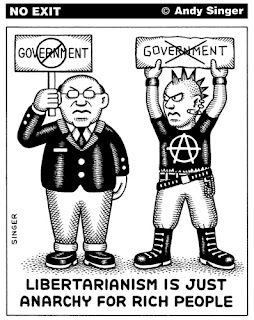H.G. Wells, in The Shape of Things to Come, appears to have been correct (if off by a number of decades) when it comes to predicting Land Value Taxation becoming a fundamental cornerstone of a saner future world system. Whether the landlords are private or public in the form of a government, the unearned rents they collect will be redistributed to all living on the land. This allows most private corporations and individual capitalists to:
1) Redirect increasing anger against them onto a relatively small number of individuals (buying time).
2) Buy off the poor without incurring too much personal cost (buying time).
3) Eliminate critical inefficiencies remaining from the dark ages and allocate capital more effectively in a world where capital accumulation has been slowing down/stagnating for decades (buying more time).
4) Push governments (that they always indirectly control when not being fused with them) of key great powers in the northern hemisphere to reinvent themselves. This allows the European continent to take the torch from United States in becoming a fortress of safety for capital via even better high tech welfare states (buying time once again by providing livable stipends to elderly and those displaced by machines).
Although it is popular to focus on either financial cartels or inefficiencies of the public sector these days, the sheer absurdity, inefficiency, and tyranny of landlords is often overlooked. It is too much part of background scenery. However, landlordism must be tackled first and directly since it is an older structural problem from a pre-capitalist world system. As we approach an end of a global debt supercycle (with governments of key military powers having to reconstruct social order to continue to function), landlordism should be emphasized as having been the primary cause of the crisis. This would create a convenient (and very necessary!) scapegoat and allow many corporations, oligarchs, unions, and governments to save face during transition to a new world system. Obviously it is one of many causes but singling it out has critically important benefits for humanity in terms of saving political energy expanded this century.
A few words about the global transition. It will either be orderly (Bretton Woods 2.0) or disorderly (trade disruptions and corresponding hunger related political violence primarily in the southern hemisphere).
For it to be more orderly, the states will need resources. Resources will be scarce (factories shutting down, balance sheets of governments and corporations in disarray, etc). Tapping private landowners the world over and forcing them to pay rent will free up resources to minimize these conditions of chaos. Since new land can't be created readily, since it can't be hidden, and since private landlords control most of the surface of the earth, it will be easy to find what/who we need and redirect the rent these people normally collect towards infrastructure/welfare of a new world system.
Although not all landlords have the same parasitic pull, the argument of "what about mom and pop landlords" is much like the 19th century argument about "mom and pop slave owners" who just had 1-3 slaves rather than the hundreds of the large plantations (large corporation equivalent of the day). Having said that, the small landlords of course will not be physically touched and will become beneficiaries of the new system that they now help provide for. Some countries already implement a partial Land Value Tax system to great benefit. Taiwan is best example today. Future merger of China and Taiwan will hopefully "infect" a large planetary role model with a more futuristic tax code.
Problem of governments as landowners
Writing in 1976, Arthur Selwyn Miller in The Modern Corporate State, articulated the rise and decay of FDRist Social Democratic arrangement in United States from 1937 onwards. What started out as a roughly coequal coalition of large unions, large corporations, large universities, and large welfare government (with emphasis on job creating benefits of the military) has deteriorated. 40 years after the book was written, we are left with large military, large corporations (private governments), large universities subordinate to these private governments, and hollowed out central "public" government subordinate to these private governments. Combined with ever present institutionalized landlordism, this heady brew can only be described as neo-feudalism (especially with the 20th century decay/stagnation of newer dynamic progressive industrial capitalist system).
Richard Nixon, the last strong relatively-autonomous American president, tried to prevent this and wanted to develop some executive government led (as first among equals) developmental authoritarianism. Franco's Spain in the 1950s springs to mind. Nixon was shown a lesson and now we have a major problem on our hands. How do we prevent the current, mostly privately led neo-feudal arrangement from transitioning to a mostly publicly led neo-feudal arrangement? How do we go forward towards new rather than backwards (only now with a glossier high tech patina).
Tapping and tackling only private landlordism will concentrate so many resources in the hands of the state that potential for mismanagement and confusion (see Soviet and modern Chinese examples) becomes all but a certainty. It will still be a better, saner, and more comfortable social order but one that would rapidly decay unless people in public governments are also viewed as much a (potentially parasitic) landlords as private landholders. This is especially important to keep in mind considering that most states in the world are effectively fused with large corporations to different degrees. Decreasing potential for corruption should be correlated to increasing complexity of civilization since preventing social unrest is difficult as is in such a densely populated world.
 |
| taxing land monopolies has no inefficiencies since supply of land is perfectly inelastic |
Sounds straightforward and surprisingly libertarian in the American sense? Yes, this brings us to a prior article on Left-Libertarianism in United States as a “glue” for the opposition. North America will be the hardest hit by the global transition since the people on that continent have utilized cutting edge technology to exhaust the current system first. This also means that most cutting edge and novel experiments in creating a new social order will happen there first. Land Value Tax provides a seemingly sensible yet ridiculously radical point of agreement towards a foundational platform of political coalitions of the future.
The planetary transition (whether orderly or disorderly) to a new international social order will span a number of decades and at first the leadership in constructing and developing it will pass to elites in the eastern hemisphere (Berlin-Moscow-Beijing-Tokyo-etc). However, once US begins to (hopefully) economically recover in the late 2020s and becomes role model for South America again (continent with the worst landlordism problem in the world), leadership should swing back to the land where both hope and world crisis began.






































